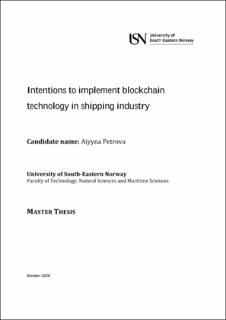Intentions to implement blockchain technology in shipping industry
Master thesis
Permanent lenke
https://hdl.handle.net/11250/2768043Utgivelsesdato
2020Metadata
Vis full innførselSamlinger
Sammendrag
The maritime industry is considered to be "slow" in the speed of development and introducing new methods to improve existing work processes. But with the emergence of a truly innovative technology like Blockchain, the industry seemed to wake up after a long hibernation and is now actively working on the study of a new technology.
The purpose of this work is to understand the basics of introducing new technology into the industry, the driving factors and barriers of implementing blockchain and to define whether intentions transferred to real actions. In this regard, a systematic literature review and exploratory multiple case analysis were carried out.
The maritime industry, long plagued by paperwork, information delays and disconnected supply chain parties, has begun to recognize the potential of the blockchain technology to transform transport management systems. Generating and executing agreements through the blockchain can allow for more accurate accounting, tracking of goods, and fleet management.
Like everything new, blockchain needs a comprehensive analysis of the advantages and disadvantages, possible risks etc. Is it as safe, transparent and can facilitate existing processes as many say? When there are few real cases, companies can refrain from implementing by being skeptical. Will they continue avoiding or will they take an example from such a giant as Maersk who is intensively working on the blockchain implementation process?
